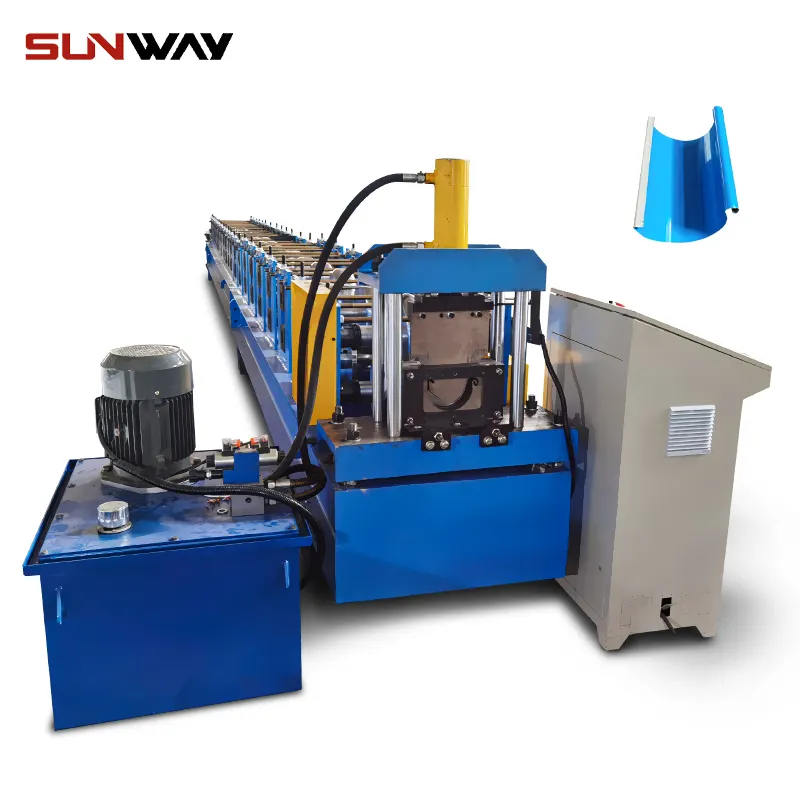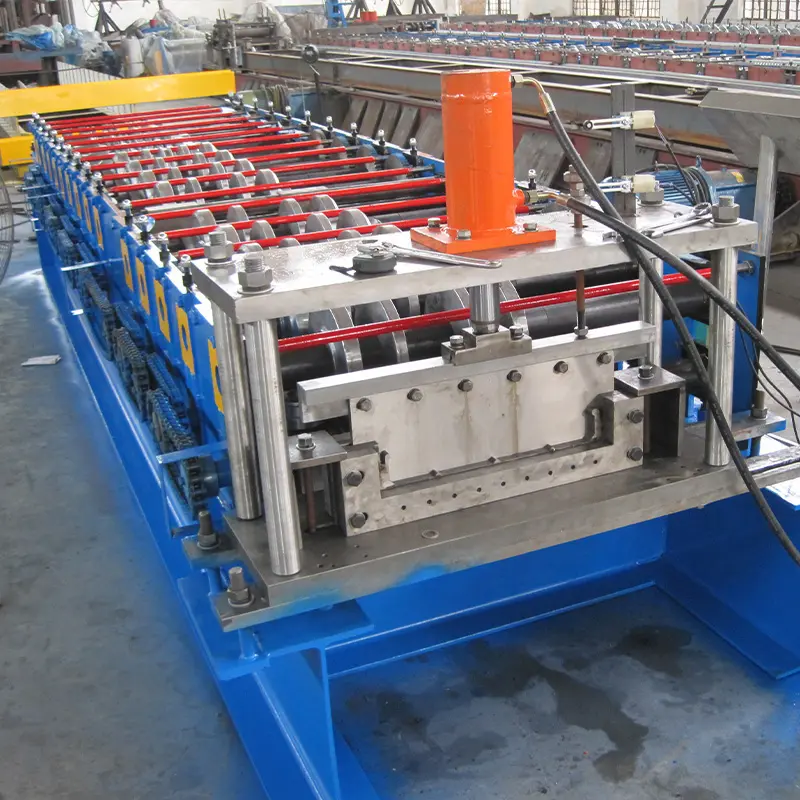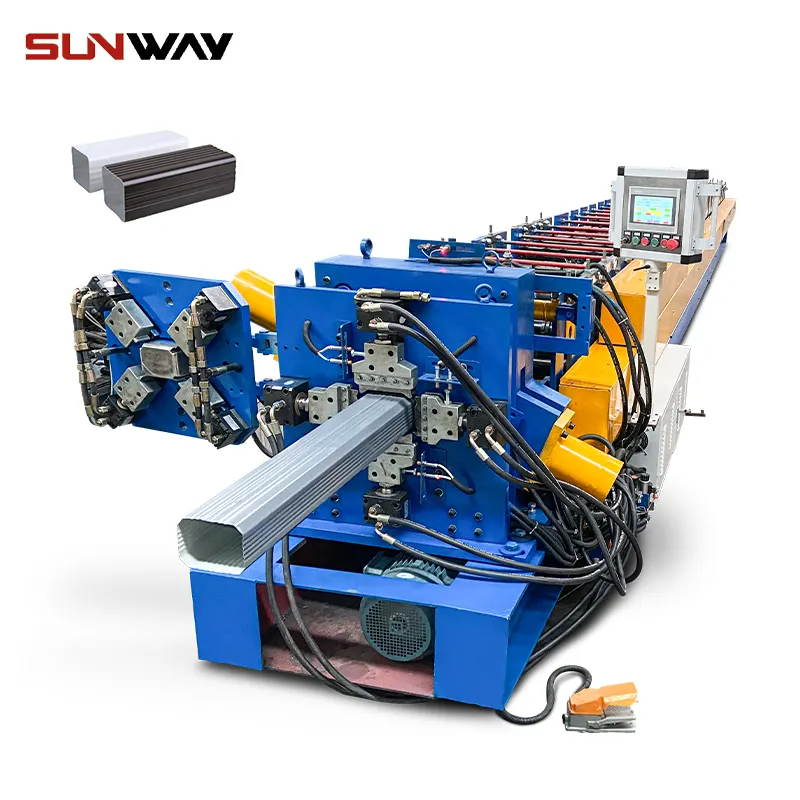Introduction
In the construction industry, roofing is a critical aspect that demands durability, aesthetics, and cost-effectiveness. Among various roofing materials, step tile roofs have gained popularity due to their appealing design and functional benefits. Step tile roll forming machines play a pivotal role in manufacturing these versatile and durable roofing tiles. This article delves into the world of step tile roll forming machines, exploring their working principles, advantages, types, components, maintenance, safety, troubleshooting, applications, and market trends.
What is a Step Tile Roll Forming Machine?
Before diving into the mechanics of a step tile roll forming machine, it’s essential to understand what it is. A step tile roll forming machine is a specialized equipment used in the roofing industry to produce step tile roofing sheets or panels. These roofing tiles feature distinctive stepped profiles that interlock with adjacent tiles, ensuring a snug fit and enhanced weather resistance.
How Does a Step Tile Roll Forming Machine Work?
The operation of a step tile roll forming machine is a carefully orchestrated process. It starts with a decoiler, where the raw material, typically galvanized or colored steel coils, is loaded. The material then passes through a series of roller stations, each bending the metal slightly to form the desired tile shape. The roll forming unit ensures precision and consistency in the tile profile. Once the desired length is achieved, the cutting system cuts the continuous profile into individual tiles. The control system oversees the entire process, and the finished tiles are stacked for further packaging and distribution.

Advantages of Step Tile Roll Forming Machines
Cost-Effective Production
The efficiency of step tile roll forming machines ensures a streamlined production process, reducing labor costs and minimizing material wastage. The continuous production eliminates the need for manual cutting and shaping, optimizing resource utilization.
Versatility in Tile Profiles
Step tile roll forming machines offer flexibility in creating various tile profiles. This adaptability allows manufacturers to cater to diverse customer demands, offering an array of designs and dimensions.
High Production Speed
These machines boast high production speeds, churning out roofing tiles at an impressive rate. The rapid production rate ensures timely delivery of orders, enabling construction projects to stay on schedule.
Durability and Quality
Step tile roll forming machines produce roofing tiles of exceptional quality. The interlocking design of the tiles enhances roof stability, making them durable and capable of withstanding harsh weather conditions.
Types of Step Tile Roll Forming Machines
Step tile roll forming machines come in several types, each catering to specific production requirements.
Single-Station Step Tile Roll Forming Machine
The single-station machine is suitable for small-scale operations, producing step tiles in a single profile. It is cost-effective and ideal for startups or businesses with limited production needs.
Duplex Step Tile Roll Forming Machine
The duplex machine offers increased versatility by producing two different step tile profiles simultaneously. This type of machine is favored by manufacturers aiming to diversify their product offerings.
Fully Automatic Step Tile Roll Forming Machine
The fully automatic machine integrates advanced technology and robotics, reducing human intervention to a minimum. It excels in high-volume production, ensuring unparalleled efficiency and consistency.
Key Components of a Step Tile Roll Forming Machine
To comprehend the mechanics behind the step tile roll forming process, it’s essential to understand the key components that make up these machines.
Decoiler
The decoiler is the starting point of the roll forming process. It holds the raw material coil and feeds it into the roll forming machine. Some decoilers come with motorized or hydraulic systems to ensure a smooth and controlled material feed.
Roll Forming Unit
The heart of the step tile roll forming machine is the roll forming unit. It consists of a series of rollers that gradually shape the raw material into the desired tile profile. The rollers are carefully designed to provide precise bends and grooves to achieve uniformity across the produced tiles.
Cutting System
Once the continuous tile profile is formed, the cutting system comes into action. Depending on the machine’s design, the cutting mechanism may involve hydraulic shearing, flying saws, or other cutting technologies to achieve accurate and clean tile cuts.
Control System
The control system is the brain of the step tile roll forming machine. It monitors and regulates the entire production process, ensuring that each step is carried out with precision. Modern machines feature user-friendly interfaces for easy operation and adjustments.
Stacker
The stacker arranges and collects the finished tiles as they exit the machine. It facilitates efficient packaging and subsequent transportation for distribution. Automated stacking systems enhance productivity by reducing manual handling.
Factors to Consider When Choosing a Step Tile Roll Forming Machine
Selecting the right step tile roll forming machine is crucial for the success of any roofing manufacturing venture. Several factors should be considered during the decision-making process.
Production Capacity
Evaluate the machine’s production capacity, which indicates the number of tiles it can produce in a given time frame. Consider your current and future production requirements to ensure the machine can meet your demand.
Material Compatibility
Different machines are designed to work with specific materials, such as steel, aluminum, or copper. Ensure that the machine you choose is compatible with the materials you intend to use.
Customization Options
If you plan to offer a diverse range of tile profiles, opt for a machine that offers customization capabilities. Versatility in tile design will cater to varying customer preferences.
Maintenance and Support
Choose a machine from a reputable manufacturer that offers reliable after-sales support and maintenance services. Regular upkeep is crucial to maintaining the machine’s efficiency and longevity.

Maintenance Tips for Step Tile Roll Forming Machines
To ensure the seamless operation of a step tile roll forming machine, regular maintenance is essential. Follow these maintenance tips to keep your machine in optimal condition.
Regular Inspection and Cleaning
Perform routine inspections to identify any wear and tear on the machine’s components. Clean the machine regularly to prevent the accumulation of dust and debris, which can affect its performance.
Lubrication
Proper lubrication of moving parts is essential to minimize friction and extend the life of the machine. Follow the manufacturer’s guidelines for lubrication intervals and use suitable lubricants.
Replacement of Worn Parts
Timely replacement of worn-out or damaged parts is critical to avoiding downtime and maintaining production efficiency. Keep spare parts on hand for quick replacements.
Calibration and Alignment
Regularly calibrate and align the machine to ensure it produces accurate and consistent tile profiles. Misalignments can lead to defective tiles and impact overall product quality.
Safety Precautions When Operating a Step Tile Roll Forming Machine
Safety should be a top priority when operating any industrial machinery, including step tile roll forming machines. Here are some essential safety precautions that operators should follow:
Training and Certification
Operators must undergo comprehensive training on the operation of the machine. Certification ensures that they possess the necessary skills and knowledge to operate the equipment safely.
Proper Use of Personal Protective Equipment (PPE)
Operators should wear appropriate PPE, such as safety goggles, gloves, ear protection, and steel-toed shoes, to protect themselves from potential hazards.
Emergency Stop Procedures
Ensure that the machine’s emergency stop buttons are easily accessible and that all operators know how to use them. Emergency stop procedures should be included in the training.
Machine Guarding
Install safety guards and barriers around the machine’s moving parts to prevent accidental contact and reduce the risk of injuries.
Common Quality Issues and Troubleshooting
Despite their efficiency, step tile roll forming machines may encounter occasional quality issues. Here are some common problems and troubleshooting measures:
Uneven Tile Profiles
Uneven tile profiles may result from misalignment or improper calibration. Regularly check and adjust the machine’s alignment to ensure consistent tile shapes.
Material Jamming
Material jamming can occur due to debris or irregular material feeding. Keep the decoiler and feeding area clean to prevent jams and interruptions in production.
Inconsistent Cut Lengths
Inconsistent cut lengths may be caused by dull cutting blades or misalignment. Sharpen or replace cutting blades as needed and ensure proper alignment for precise cuts.
Applications of Step Tile Roll Forming Machines
Step tile roofing has found applications in various construction projects, including residential, commercial, and industrial buildings. Its aesthetic appeal and functional advantages make it a popular choice for roofing solutions.
Market Trends and Outlook for Step Tile Roll Forming Machines
The roofing industry is continuously evolving, and step tile roll forming machines play a vital role in meeting market demands. Technological advancements, such as automation and digital controls, are likely to enhance machine efficiency and product quality further.

Conclusion
Step tile roll forming machines have revolutionized the roofing industry by providing a cost-effective and efficient solution for producing durable and attractive step tile roofing sheets. With their versatility, high production speeds, and easy customization, these machines have become an indispensable asset for roofing tile manufacturers. Adhering to safety protocols and proper maintenance ensures smooth operations and consistent production quality.
FAQs
Whaet is the production capacity of a typical step tile roll forming machine?
The production capacity of a step tile roll forming machine can vary depending on the machine’s size and design. Generally, it can produce between 15 to 25 tiles per minute.
Can step tile roll forming machines produce different tile profiles?
Yes, modern step tile roll forming machines can be customized to produce various tile profiles, allowing manufacturers to meet diverse customer demands.
Are step tile roofs more durable compared to traditional roofing materials?
Yes, step tile roofs are known for their durability and weather resistance, making them a reliable choice for long-lasting roofing solutions.
What safety measures should operators follow when using the machine?
Operators should undergo proper training and wear appropriate PPE. They should also be familiar with emergency stop procedures and adhere to machine guarding protocols.
How do I maintain the quality of the tiles produced by the machine?
Regular maintenance, including inspection, cleaning, lubrication, and timely replacement of worn parts, is essential to maintain the quality of tiles produced by the machine.
